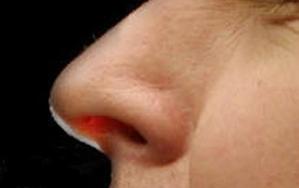英国巴斯大学的科学家最新研究发现,在特定扫描技术的帮助下,安全人员可以通过人的鼻型辨识出非法移民、恐怖分子或者犯罪分子,而且因为鼻子不容易隐藏,因此其辨识的可信度比指纹或虹膜的扫描识别度要高。据介绍,用来实施这种特定扫描功能的仪器叫做PhotoFace,它会从几个不同的角度拍摄鼻子的图片,然后,根据现有的罗马鼻,希腊鼻,蒜头鼻,鹰钩鼻,朝天鼻,以及小俏鼻等六种主要鼻型对上述图片进行分析。其后,还会用专门的软件对鼻头、鼻梁及鼻根进行深入分析。研究人员表示,获取鼻子的图片信息比获取虹膜或指纹要容易得多,在对付不合作的安检对象时,用这项技术能够更容易达到目的。

 |
|
New technology designed to read the unique shapes of each nose could be used to identify Illegal immigrants, terrorists and criminals, experts claim. |
Scientists have discovered an unlikely new weapon in the fight against international terrorism – the human nose.
New technology designed to read the unique shapes of each nose could be used to identify Illegal immigrants, terrorists and criminals, experts claim.
The nose is more reliable than fingerprints or irises as a means of identification because it is harder to conceal, they say.
A new scanner, known as the PhotoFace, takes four flash-lit photographs lit in rapid succession from several different angles.
The nasal images are then analyzed according to six main shapes – Roman, Greek, Nubian, Hawk, Snub and Turn-up.
Each nose is then further tested by computer software to analyze its profile, the tip, and the nasion – the top of the nose where it meets the eye line.
Dr Adrian Evans, who conducted the research behind the technology at the University of Bath, said scanning noses could be an easier way to verify an identity than iris and fingerprint scans.
''There's no one magic biometric – irises are a powerful biometric, but can be difficult to capture accurately and can easily be obscured by eyelids or glasses,” he said.
''Noses, however, are much easier to photograph and are harder to conceal, so a system that recognizes noses would work better with an uncooperative subject or for covert surveillance.''
相关阅读
(Agencies)

(中国日报网英语点津 Helen 编辑)